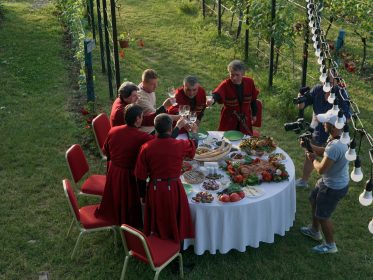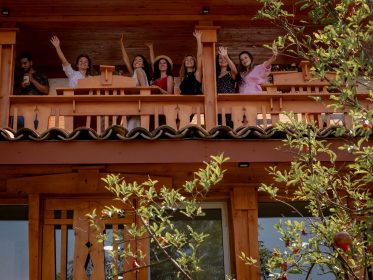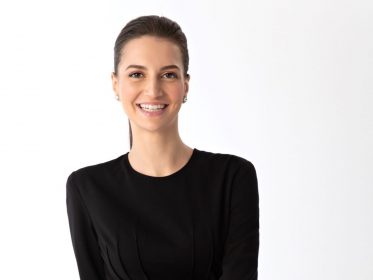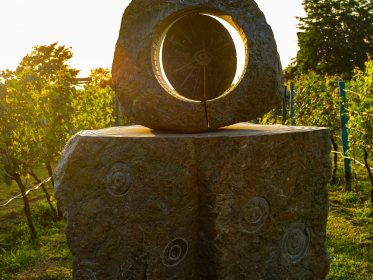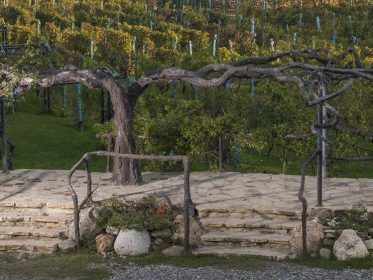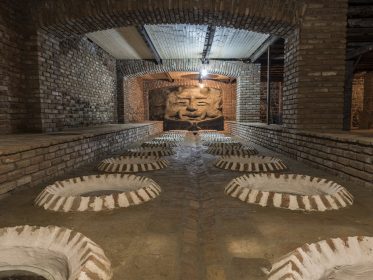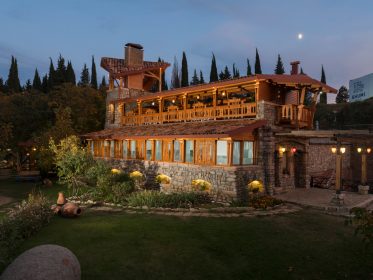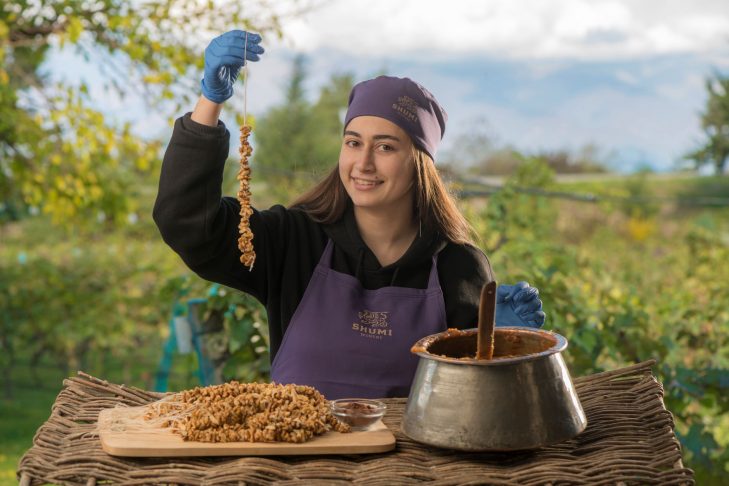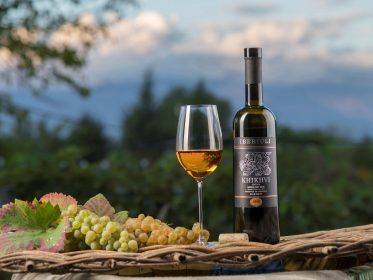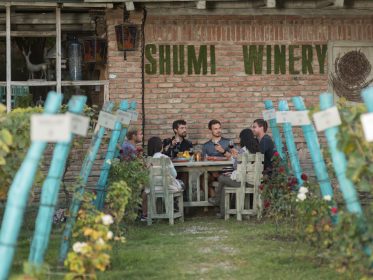Salome Lomsadze: “You can’t produce wine and not think about beauty, nature, people…”
Winetravelavards.com columnist talked to Salome Lomsadze, Commercial project manager, a representative of the young generation of top management of the unique Shumi Winery complex. Believe us, they had something to talk about!
Let’s start with the fact that your winery, located in Georgia, the country where winemaking dates more than 8 thousand years, became the winner of the Wine Travel Awards in the Magnet of the region category. And in such a region, such a title is worth a lot. In addition, we know that back in 2019, the territory of the Shumi complex was recognized as the most beautiful in Georgia!
Regarding participation in the WTA, Shumi Winery became the record holder among the nominees, being nominated for nine different categories and conquering all of them during the public voting stage. Also, a significant part of the international judges in the second round of evaluation of the nominees gave the Shumi complex the highest scores and literally a few points were not enough to win in several more categories! Congratulations on your victory!
Thank you! In turn, I want to thank your company for the excellent organization of the Wine Travel Awards, which met all expectations. It is a pleasure to be your partner. Based on my experience in holding corporate events related to tourism, I can say that everything went at a very high level of understanding of how it should be launched and organized. I have worked with organizations from different countries, and I want to note your comprehensive and forehanded approach – everything from PR and marketing to the organizational part, logistics, communications and certificates, and how all this was presented – a clear and correct “packaging” of the WTA.
Thank you for the kind words about the Wine Travel Awards and the work of our team, we hope that our cooperation will be developing in the future. We would like to learn more, and tell our readers, about Shumi Winery. Let us start with symbols. What does the name “Shumi” mean and why is the company’s emblem depicting a griffin?
Everything is simple here: the word “shumi” in the ancient Georgian language meant “the best of wines”. The one that we call exclusive, premium in the modern world – that is to say, a product of the highest quality. This is both our name and our principle: to create wines of the highest quality, and we have been following such a principle for the past 25 years. It should be emphasized that it was no coincidence that the Faskundzhi griffin became the symbol of Shumi Winery: this is a character from Georgian mythology. According to the ancient legend, it was he who brought to the people the first bunch of grapes, which gave rise to the cultivation of vineyards and winemaking on our land.
Salome, how did Shumi Winery start? You are a representative of the younger generation, but you are certainly aware of this amazing story. The founders immediately placed a bet not only on the production of wine, but also on tourism, or did the understanding of the importance of this vector come with time? In your opinion, what has led Shumi Winery to such a bright success: tourism or wine?
You are right: initially the bet was placed on both production of wine and tourism. I think that in our case, we should not separate these concepts. Certainly, the first vineyards had been planted, and thereupon production was launched; already in 2002, Shumi was the first in Georgia to open the doors of its tourist complex, where guests can find more about the wine culture, specifically, they are able to visit the wine museum, participate in wine tastings, harvesting, and various culinary master classes. All this was done to show to the whole world the potential of Georgian wines and reveal the magic potential of our autochthonous varieties. Due to this assignment, we have created a company incorporating viticulture, winemaking, and tourism.
It is not a secret that in Georgia, people are very passionate about winemaking. For example, if we talk about our winery in Tsinandali, I should say that almost everyone who lives in these places is directly connected with the production of wines. Our employees give much care and love to their work, thus helping us achieve our goals. Our success is directly linked with the fact that Shumi Winery treats our traditions with care and love, all employees share these values, and hospitality is an integral part of Georgian culture. This is the approach we are resorting to, when creating products – be it wine, excursions, master classes or events for guests.
Tell me please, Salome, whether Shumi Winery employed foreign specialists or relied exclusively on the wisdom, love for winemaking, and the experience gained by the Georgian winemakers.
Since 2005, we have been cooperating with the famous French winemaker Jean-Michel Ferandet. Since the very first day, Jean-Michel has been admiring the unique terroirs of our vineyards, local autochthonous varieties, and particularly, the Saperavi variety, and he believes that the 21st century, on a global scale, belongs to the Saperavi variety. The French winemaker generously shared his knowledge with our winemakers. Giorgi Khatiashvili, who is now very famous in Georgia and has been working with us for more than two decades, was among his students. Incidentally, I presume that such loyalty and stability of personnel is also an indicator and guarantee of our company’s success.
According to the statistical data, for many winemakers, wine tourism is becoming the leading vector, and for some wineries, income from tourists prevails over the sale of wines outside the winery. How is your company doing? Are there any statistical data available for this area?
Shumi Winery is a major producer, and, undoubtedly, retail sales constitute the main source of income. Such wine production volumes intended for export can hardly beat the tourism proceeds.
The tourist complex is our soul, a kind of window through which we communicate with the world and show our essence to our guests, wine lovers. Here, we talk about the intricacies of contemporary wine production and the ancient technology of qvevri, about the varieties and types of wines, as well as our collection of vineyards, harvesting methods, and scientific work that is being carried out. As concerns the statistical data, the retail sector represents the main part of income, tourism is rather a method of promoting wines, a certain point of communication between the consumer and the brand. The point, where a special kind of loyalty is being developed.
Our business related to the winery has two vectors: distribution, and wine and gastronomic complex. All these [vectors] exist simultaneously, but the tourist complex can be built without a winery. For us, the most important thing is wine.
The tourist complex, which opened its doors in 2002, has already won more than one international award. The same can be said about the Shumi wines, which are annually awarded a bunch of medals at various competitions. Please tell us in more detail, what kind of an enogastronomic complex Shumi has.
Given our DNA, it was a natural decision to create such a platform where we present the culture of winemaking and viticulture, the culture of hospitality. The tourist complex and the winery are located in the village of Tsinandali, Kakheti, a territory awash with history, which at various times belonged to the Georgian and Kakhetian kings, the family of Prince Alexander Chavchavadze. However, when we bought the land, there was – and you won’t believe it – a garbage dump and a swamp. In addition, there was practically no soil – it was once washed away by the river and only bare stones remained. It took a lot of effort to put everything in order, drain the wetlands and clear the area. We imported land, cultivated vineyards, and orchards. It should be emphasized that we consider protection of nature and improvement of the land as one of our priority tasks. You can’t produce wine and not think about beauty, nature, and people…
It will not be an exaggeration if I say that guests visiting us are immersed into the Georgian culture of winemaking. Everyone can visit the Vine Museum, the Wine Museum, the Georgian Ethnographic Pavilion, where we organize master classes in cooking, bread baking and tasting, crushing grapes in a three-hundred-century-old solid wood wine press, distilling chacha, etc. Our marani wine cellar, where qvevri wines are produced, also attracts tourists. No wine collector or connoisseur would skip a visit to the Shumi Winery enoteca, where the very first releases of wines from our winery are presented. A beautiful garden with flowers and rare plants, a sculpture park, gastronomic zones, where you can taste a lot of delicious things – all this ensures that a visit to Shumi would leave no one indifferent. Guests are happy to share on social networks their videos from various master classes, and events that we celebrate.
In the tourist complex, there is a great diversification of the services offered. For example, there are many offers for local residents who come just for relaxation during the weekend, some guests would order banquets: with a traditional toastmaster, and the noise of many voices. We organize a large number of events for foreigners who want to get to know Georgian culture better. In addition, we often hold events for the wine industry professionals, who want to learn more about our production.
Generally speaking, Shumi Winery opens up for its guests the Georgian culture: famous Georgian artists, musicians, singers, and dancers give their performances here. I recall that once our team of journalists, at the invitation of your director, participated in a supra feast and enjoyed wines, dishes, dances, and male-voice polyphony. Please tell us about the events and festivals that are held at Shumi Winery. Are there any international events of such kind, attracting influencers from all over the world?
The most significant festival, which is loved by both Georgians themselves and guests from different countries, is Rtveli, which is a grape harvest festival in Georgia. From September to mid-October, our guests participate in the grape harvest and the production of wine according to ancient technology. Accompanied by the performance of our ensemble Shumi – with traditional Georgian polyphony – the guests are participating in grape-stomping (crushing grapes with their feet) in the ampelographic pavilion. A special energy, and friendly, unifying atmosphere reign at the festival. The guests are cooking churchkhela, khachapuri together, raising glasses, and saying toasts; to cut a long story short, they become one big family celebrating a wonderful holiday.
This year, we are preparing special events, surprises, and gifts for guests for the Rtveli festival. Our sculpture park will also be replenished with a new collection, where the works of Zurab Tsereteli, Merab Merabishvili, Gia Japaridze, and many other masters are collected.
Superb! We will be waiting for your video from this anniversary celebration, which – we hope – you will share with the Wine Travel Awards community?! Which exhibits of the Wine Museum are you most proud of?
I would like to emphasize that our museum is the first Wine Museum in Georgia. The oldest artifacts are over 6000 years old. I am particularly fascinated by the qvevri wine vessel, which is 3200 years old. It was collected from fragments, and we revealed an amazing ornament. How much love was contributed into this vessel by the master who created it! Even despite the fact that no one was supposed to see this ornament, because qvevris are buried into the ground. This is an amazing story about harmony, the person’s desire to pass on the love for his work, his skills, to the next generations: both due to the vessel contents, and through the ornament, the harmonious form of qvevri.
This sincere Georgian feast is famous all over the world – I mean supra, which is led by a toastmaster like a well-coordinated choir is managed by a conductor. How is this skill taught at the School of Toastmasters, available in Shumi Winery? I simply can’t imagine how one can create a manual on such a subject? Who are the teachers and students, and how long does the course take?
The School of Toastmasters is obviously not an educational institution in the conventional sense. This is an introduction into the art of toastmaster in a broad sense, and primarily, through practice)). Since our enogastronomic tourist complex is dedicated to the culture of Georgian hospitality, we cannot help but introduce our guests to the supra, a traditional Georgian feast. Should I mention here that the theoretical part takes minimum hours of the program? We just create a festive atmosphere for the Georgian feast. The school of toastmasters is an integral part of the Georgian tradition, and during the supra feast, we explain (and show in practice!), what toasts, in what sequence and how, are pronounced; what actions should accompany making such toasts (this is a musical accompaniment), and many more various particularities. For example: who should get up when making a toast, who and when has the right to say it, how we are clinking glasses, what toasts we are saying, in whose honor, etc.
Tell us more about the Shumi School of Wine, what and how it teaches. Is there a Faculty of Tourism available at the School?
The School of Wine is a professional school based on our production facilities and ampelographic collection vineyard. It is the largest private vineyard in the world with over 1,300 grape varieties. We educate everyone who is related to viticulture and winemaking. We are talking about the agrotechnics of grapes, including bio- and biodynamic methods of growing grapes. We teach how to make wines, including theoretical and practical aspects. Both wine lovers and those who consider wine to be their life’s work, show great interest in our school. Before the quarantine restrictions, we had achieved a very good performance. We are currently in the process of restarting. There is a well-established training system, but we want to add online lectures that were introduced during the pandemic. In addition, the market has been updated, and new topics have emerged. We can say that now, we are searching for new ideas. Incidentally, our school does not have a faculty of wine tourism, but I would like to thank you for this idea – I like it! We have a lot of developments in this regard, interesting cases – and we are ready to share them with those who want to organize tourist activities at their wineries.
Are there any tours included in your offer? If so, to which regions, to which attractions? For example, due to the visit to Shumi Winery, we once observed the Kindzmarauli microzone for the first time, and were guests at a very simple but unforgettable supra in the vineyard …
Right you are, in addition to the work of the tourist complex, which was presented at the WTA, we also organize feasts and picnics directly in the vineyards, in the same Kindzmarauli microzone: it is renowned for simply amazing nature and unforgettable views. We are open for cooperation with agencies, we can provide a platform, catering or organize a helicopter tour around Kakheti, share our contacts, and give recommendations. If our guests choose a location, they set up a tent on their own, whereas we organize catering, wine, drinks, render assistance in maintaining the concept of such celebration with relevant master classes, and reflect such a concept in our menu, drinks. We resort to an individual approach towards organization of each event.
We know that the company is not living by tourism alone. In 2020, Shumi Winery was recognized as the best wine producer in Georgia at one of the most prestigious competitions in the world – MUNDUS VINI Grand International Award! What are your company’s particularities that have enabled you to attain such results?
I can say that a complex of components has led us to the success of Shumi Winery products. First things first, from the very day of foundation, we have been striving to apply the world’s best international experience in wine production practices.
From the very beginning, we were focused on everything related to classical international business standards – both in terms of safety and quality. Applying the international practices since 2005, we receive all necessary international certificates. We produce biodynamic wines and work to ensure that the technologies we use in production are not harmful to the environment. After all, viticulture and winemaking are inextricably linked with the entire ecosystem.
Since its establishment, the company has been focused on the production of a full cycle: this is also an important component that helps us produce high-quality wines.
A major role in our achievements is attributable to the unique microzones, in which our vines grow. All of them, like the appellations of France, differ significantly from one another in terms of their soils, conditions in which grapes with different technical characteristics are growing. The unique terroirs of Mukuzani, Tsinandali, Kindzmarauli, Khvanchkara are simply precious lands, where grapes have been grown, and wine produced for thousands of years. In addition, the main part of what we produce includes wines from local autochthonous grape varieties.
In our ampelographic collection vineyard, a huge number of scientific experiments are being conducted. We are studying the potential of vines and current technologies for working with different grape varieties. It is simply impossible to emulate what we manage to attain.
What wines and national drinks have recently replenished the range offered by Shumi Winery? Which of them are of the greatest interest to consumers, distributors, and importers?
We have a wide range of products both in the tourist segment and in wine production. We have classics: Saperavi, Mukuzani, Kindzmarauli, Khvanchkara, presented in the Shumi lines and in the premium Iberiuli line, which is distinguished due to a green harvesting method. In addition, we are all passionate about our exclusive line, where ZIGU has a special place. I have not yet met a single specialist at various tastings who would not be surprised by this drink, created out of grapes from our ampelographic collection vineyard and having no analogues in the world. We also have a unique qvevri sparkling wine called Brut Natur “Shobili”, which is produced according to the classic champagne method. And I would certainly like to distinguish the brandy Griffin, which is filled into a porcelain vessel having the shape of “Griffin” – a work of art by the great Georgian sculptor Merab Merabishvili.
In addition, we make exclusive drinks from the grapes of the collection vineyard, and the latter serves as a basis for scientific works. For example, we have revived the Simonaseuli grape variety and produce wine bearing the same name. In the near future, we hope to impress you with other rare Georgian grape varieties.
Goodness me, we didn’t even know this was possible! I really want to visit you again and see with my own eyes how these wonderful drinks are made.
Well, we do have something to impress even the most sophisticated individuals! I would also like to distinguish Barbale ice wine made from 102 varieties of grapes, which are harvested at sub-zero temperatures from our collection vineyard. In addition, we produce chacha, brandy, and exclusive drinks from Saperavi. This is a super potential grape variety that never ceases to amaze the wine experts. We adhere to strict technologies for the production of wines that can mature, age, and get aged in bottles for a long time. We also have such unique wines as “Genesis”, created from the most ancient vine in Georgia, which is about 300-400 years old. It does not bear fruit every year, so this drink is particularly valuable. I would also like to mention Lazare wine, created from more than 450 grape varieties and presented in hand-painted bottles. At the current stage, we are updating the IBERIULI line: we have done restyling and new labels. It should be pointed out that all these areas are developing simultaneously.
In addition, we continue to carry out our scientific work, conduct experiments, and create new drinks. Now, we have more than 30 ancient unknown varieties planted in our vineyard, which we have saved and revived, and our ampelographic device has not even established their names yet. We want to evaluate their potential and create wines from these varieties in the future.
I happened to come across a tasting commented by Andreas Larsson on the Internet, which was related to Salome Premium 2014 wine. I dare to assume that the coincidence of your names is not accidental. Tell us more about this wine and this vintage, please. What was the release, is it possible to buy it today, with a lapse of 8 years, and where? What condition has it acquired?
Right you are – the coincidence is not accidental, but it would be immodest of me to tell this story. Salome wine is the first Georgian bio and biodynamic wine. It has been produced since 2005 using exclusive technology, in limited quantities. Salome is harmoniously developing in the bottle, and can age beautifully for 25 years.
What channels do you prefer to affect sales: retail, HoReCa, duty free? What percentage of the total volume is attributable to the sales at the winery?
Shumi Winery is a large-scale production, and our products are supplied to the markets of more than 30 countries around the world. According to the business model, we work with HoReCa through distributors available in our country. We are dealing with the duty-free segment directly. However, the main share of income is resulting from retail. There is also a store in the tourist complex, but it represents a disproportionately small sales volume when compared with international distribution.
Thank you, Salome, for an incredibly interesting conversation. Even for us, who are well aware of Shumi’s advantages, many things were just a revelation! And consequently, even new ideas emerged)). We are confident that having become the winner of the Wine Travel Awards, Shumi Winery, in collaboration with our media group, will be able to surprise the global wine community more than once. You already have everything required for this!
D+ Files
The Shumi Winery complex is located in the famous region of Georgia – Kakheti, in the village of Tsinandali. These lands once belonged to the Georgian and Kakhetian kings, the family of Prince Alexander Chavchavadze. We can confidently state that all of the most iconic values of Georgian culture are collected here. Shumi Winery includes 38 locations: the world’s largest vineyard with a private ampelographic collection, the first Wine Museum in Georgia, a sculpture park, a marani cellar with a tasting room, an enoteca, an ethnographic pavilion with a bakery, a winery, space for culinary master classes, and much more.
Author: Nataliia Zakharchuk

